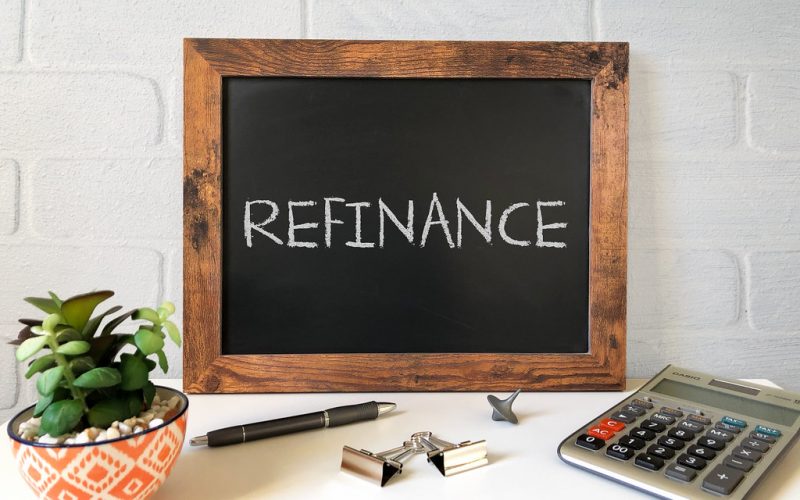Refinancing is the process of taking out a new loan to pay off one or more outstanding loans. Borrowers frequently refinance when the interest rate environment changes significantly, resulting in possible debt payment savings from a new agreement. You can also use refinancing to secure a longer-term loan with lower monthly payments. This is however best for debtors who are struggling to pay off their loans. Because interest must be paid over a longer period of time in these circumstances, the total amount paid will rise. In this article, we’ll be discussing the Mortgage Refinancing Loans calculator, cash-out, and how they work.
What Is Refinancing Loans?
Refinancing is the process of changing and updating the terms of an existing credit agreement, notably as it applies to a loan or mortgage. When a corporation or an individual decides to refinance a credit obligation, they are attempting to improve their interest rate. If authorized, the borrower receives a new contract that replaces the previous one.
Borrowers may refinance because their credit score has improved, because their long-term financial plans have changed, or to consolidate their existing obligations into one low-cost loan. To refinancing, a borrower must approach their current lender or a new one with their desire and fill out a new loan application. Following that, refinancing entails re-evaluating a person’s or a company’s credit terms and financial situation. Mortgage loans, vehicle loans, and student loans are all common consumer loans that are considered for refinancing.
How does Refinancing Loans Work?
A borrower can refinance a loan to replace their present debt obligation with one that has better terms. A borrower takes out a new loan to pay off their existing debt through this method, and the conditions of the old loan are replaced by the revised arrangement. Borrowers can restructure their loans to achieve a cheaper monthly payment, a longer-term, or a more convenient payment schedule. The majority of traditional consumer lenders also provide refinancing options. Refinancing loans, on the other hand, tend to have slightly higher interest rates than purchase loans for things like mortgages and vehicle loans.
Borrowers refinance for a variety of reasons, the most common of which is to obtain a more inexpensive loan. A refinancing can frequently cut the interest rate. A homeowner with solid credit who took out a 30-year mortgage in 2006, for example, would likely pay an interest rate of between 6% and 7%. Currently, the best-qualified borrowers can get interest rates as low as 4%. As a result, by refinancing their loan, that homeowner may save hundreds of dollars every month by shaving more than 2% off their interest rate.
Refinancing Loans Calculator
With the Refinancing calculator, you could find out if refinancing can help save money on interest over the life of your loans. However, there are so many refinancing loans calculators online that could help you estimate how much you can save. Here are some of the Calculators you could try.
Quicken Loans
They claim their refinancing loans calculator uses up-to-date current rates. You can use this calculator to calculate your mortgage rate and students loans. Once you enter your numbers press “Calculate,” you’ll see a list of recommended loans, terms, and rates. You can try quicken loans, online refinancing calculator.
Nerdwallet
Nerdwallet is a highly acclaimed refinancing online calculator for calculating loans. Just like quicken you can use this calculator to calculate your mortgage rate and students loans. You can try the Nerdwallet calculator to see if it is suitable for you.
Bankrate
The Bankrate Mortgage Refinance Calculator will give you an idea of how much you stand to save (or lose).
Mortgage Refinancing Loans
The term “mortgage refinancing” refers to the process of replacing current home loans with new ones. You apply for refinancing in the same way you would for any other loan. This may include a thorough examination of your credit, income, employment history, and financial situation. A home appraisal is also required by a lender to determine the current market value of your house and the amount of equity you have in it.
When you refinance, the borrowed funds from your new loan are used to pay off your old one. The majority of customers refinance to lock in a cheaper interest rate and cut their monthly payments, or to reduce their mortgage term. You can also seek a cash-out refinance, which allows you to borrow against your home’s equity. It takes out some or all of the difference between what you owe and what it’s worth now. In theory, you’ll also get a cheaper rate as a result of the process. You can utilize the money you get from your house’s equity to pay off high-interest debt or renovate your home.
Read Also: Refinancing Home Loan: Rates, Costs and All You Need.
Homeowners refinance their mortgage loans for some major reasons. One of which is to lower their monthly payment or to reduce the term length from a 30 to a 15-year mortgage. Homeowners who used an FHA mortgage a government-backed product that allows for a low down payment. For example, must pay more mortgage insurance than those who used a regular mortgage, which only requires insurance until 20 percent equity is reached. To avoid paying mortgage insurance, an FHA borrower who has reached the 20% barrier can refinance into a conventional loan.
Similarly, many borrowers choose a 15-year mortgage in order to pay off their debt faster. If you have the means to make a larger monthly payment, a shorter-term can save you a lot of money on interest rates; 15-year loans have lower rates, and interest won’t be accruing for as long.
It’s crucial to remember that closing costs can be fairly significant. So refinancing to shorten your term or lower your monthly payment by $100 or $200 may not be worth the time and money it takes to secure a new loan. Alternatively, if you have extra money, some lenders will let you recast your mortgage to lower your monthly payments.
Businesses may also attempt refinancing commercial property mortgage loans. Many business investors may examine their financial statements for business loans granted by creditors. Who in turn could profit from cheaper interest rates or a better credit score.
Cash-Out Refinancing Loans
A cash-out refinance is a mortgage refinancing option in which an old mortgage is replaced with a new one that is bigger than the previous loans. This allows homeowners to obtain cash out of their houses.
One of the finest solutions for borrowers is a cash-out refinance. It provides the borrower with all of the benefits of traditional refinancing. This includes a lower rate and possibly other advantageous changes. Borrowers who choose for a cash-out refinance receive cash that they can use to pay down additional high-interest debt or even support a significant purchase. When interest rates are low, or in times of crisis, such as in 2020 in the aftermath of worldwide lockdowns. Lower payments and some additional income can be quite beneficial.
A cash-out refinance works like this. The borrower locates a lender who is willing to collaborate with them. The lender considers your previous loan terms and the borrower’s credit rating. An underwriting study is used by the lender to make an offer. The borrower receives a new loan that pays off the old one and commits them to a new monthly payment schedule in the future.
A conventional refinance does not result in the borrower receiving any cash, only a reduction in their monthly payments. A cash-out refinance may allow you to borrow up to 125 percent of your home’s worth. This means that the refinance pays off the debt. While the borrower may be eligible for up to 125 percent of the value of their home. The money left over after the mortgage is paid off is given to you in cash, like a personal loan.
Bad Credit Auto Refinancing Loans
If your credit hasn’t improved since you acquired your original auto loan, refinancing your car loan with bad credit may be possible, but it may be tough to secure a cheaper rate. The worse your credit score, the higher your interest rate will be in general.
If interest rates on vehicle loans have dropped since you took out your current loan, you may be able to get a better deal. One approach to evaluating if rates have improved in general is to look at historical statistics on average interest rates on new auto loans. If the interest rate on your original loan was higher than today’s rates, it might be worth looking into refinancing at a lower rate.
However, keep in mind that new-car rates are not the same as refinance loan rates; historical data is merely a guide to how auto loan interest rates are trending. You may need to prolong your loan term if your refinance aim is to acquire a lower monthly payment (rather than a lower rate). Keep in mind that a longer-term may result in a higher total amount of interest paid throughout the life of your loan.
Conculsion
If you want to refinance a loan, you should first read the terms of your present arrangement to discover how much you’re paying. Check to see if your present loan has a prepayment penalty, as the benefits of refinancing may be offset by the cost of early termination. After you’ve determined the value of your present loan, you can shop around with a few lenders to locate the conditions that best suit your needs.
A multitude of loan choices is available on the market today. Whether you’re trying to modify term lengths or lower your interest rate. There are services and packages geared to all financial goals, thanks to internet lenders aiming to compete with established banks. This competition can help qualified customers save hundreds or thousands of dollars on their loans.
FAQs
What is difference between finance and refinance?
Finance means to supply or gain funds for a transaction or endeavor; to assist, whereas refinance is to extend the terms of a loan.
How much equity do I need to refinance?
To perform a cash-out refinance, most lenders ask that you have at least 20% equity in your house.
How Much Does Refinancing Cost?
Lenders will charge you a fee when you refinance, just as they would if you take out a new loan.
Why do you refinance a loan?
Refinancing your mortgage can help you lower your monthly payment, save money on interest throughout the life of your loan, pay off your mortgage faster, and access the equity in your house if you need money for any reason.






